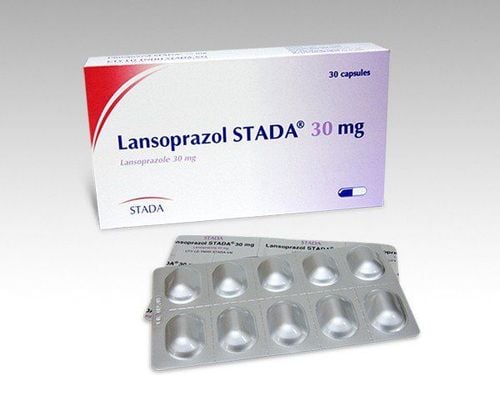This is an automatically translated article.
The article is professionally consulted by Doctor Vo Thi Thuy Trang - Gastrointestinal Endoscopy - Department of Medical Examination & Internal Medicine - Vinmec Da Nang International Hospital. Doctor has nearly 20 years of experience in the field of gastroenterology - Hepatobiliary tract.Anyone is at risk for dysphagia, especially in the elderly, premature babies, or those with nerve and brain problems. To completely treat dysphagia in patients, the doctor will have to base on the cause of the disease.
1. What is dysphagia?
Dysphagia is one of the medical terms that describe a patient's difficulty in swallowing, caused by pathologies in the esophagus or pharynx. Depending on the stage of the disease and the location of each person, the degree of difficulty in swallowing will be different quickly, when it is mild, the patient may only feel sharp pain when swallowing food, drinking water and the sensation of passing through food. manage longer.When dysphagia is severe, even liquids and solids cannot enter the esophagus and can cause the person to vomit all the food and water out.
In normal people, swallowing can take place many times a day to help food, liquids and substances secreted by the body enter the body, the swallowing process includes the following stages:
The first stage: Is the stage when food is in the oral cavity, here, food and liquid will be chewed and mixed to prepare for swallowing. Stage two: In the oral phase, the tongue pushes the food or liquid in the oral cavity to the back of the mouth and stimulates the swallowing reflex. Stage Three: Also known as the pharyngeal stage, food and liquid pass through the pharynx and then into the esophagus. Stage four: Food and liquid will pass through the esophagus and go straight to the stomach.
2. Warning signs of dysphagia

More saliva in the oral cavity Frequent feeling that liquid or food is stuck in the throat Always feeling like foreign body or something stuck in throat An uncomfortable feeling in the chest or throat Unexplained weight loss due to constant choking or swallowing Cough and choking when eating and drinking Voice changes
3. What causes difficulty swallowing?
Patients with dysphagia can be caused by objective and subjective causes. Common causes include:Patients with esophageal stricture due to severe esophagitis Esophagitis is a disease showing inflammation of the lining of the esophagus caused by acid reflux from the stomach or other agents. is different. Acid causes the lining of the lower esophagus to become inflamed. Esophagitis caused by acid reflux is a fairly common disease, however, complications of esophageal stricture may cause difficulty swallowing in patients
Esophageal cancer Esophageal cancer is a dangerous incurable disease. and uncommon, susceptible subjects are often older than 55 years of age, early diagnosis of the disease at an early stage can provide a chance for cure and reduce the risk of death for the patient. When suffering from this disease, the patient may also have difficulty swallowing due to the growth of tumors and narrowing of the esophagus.
Esophageal stricture due to other causes Patients have difficulty swallowing due to narrowing of the esophagus (esophagitis or esophageal cancer), however, it can also be due to other causes such as after esophageal radiation therapy or surgery, Ingesting detergents or chemicals that can destroy...
Diaphragm or esophageal ring Esophageal rings or diaphragms are benign tumors that develop from esophageal tissue, causing difficulty This swallowing is rarely encountered in patients and sometimes patients with esophageal ring and diaphragm also cause no symptoms other than difficulty swallowing, swallowing problems.
Esophageal lethargy is a disease that can affect both nerves and muscles to control the esophageal muscle. Patients with esophageal atresia will have muscles that cannot contract to push food down to the stomach, in addition, the sphincter and opening at the wrong time will also prevent food from passing through the esophagus to the stomach properly. easily, this has caused the patient to have difficulty swallowing.
Have other neurological diseases Having other neuromuscular disorders in the body will also affect the esophageal and nervous system and cause dysphagia. However, in these cases, the patient will often see a few additional symptoms.
Extrinsic compression into the esophagus Extrinsic compression of the paraesophageal structures can also be the cause of dysphagia in patients. As with other causes, symptoms of external pressure on the esophagus will often precede dysphagia.
Pharyngopharyngeal diverticulum This is a rare disease where the diverticulum ends in separation from the lowest part of the pharynx, the hypopharynx, laryngopharyngeal diverticulum usually occurs in patients over 70 years of age and may not cause a laryngopharyngeal diverticulum. symptoms other than choking and a feeling of something stuck in your throat, coughing, difficulty breathing, and regurgitation of food.
In addition to the causes of dysphagia mentioned above, patients can also experience this disease when they have various rare diseases and cause inflammation or decreased function of the esophagus....
4. How is dysphagia diagnosed?

In addition, a number of other tests may be performed, including:
Contrast barium: To help find disease in the esophagus. Laryngoscopy: Looking at the back of the patient's throat, using a mirror or fiber-optic scope. Esophageal endoscopy or upper gastrointestinal endoscopy Esophageal manometry: The technician will use a pressure sensitive tube inserted through the nose or mouth into the patient's esophagus to measure the pressure of contraction of the esophageal muscles. Electroluminescence Monitoring pH Computed tomography or magnetic resonance imaging (MRI). After accurately diagnosing the disease condition and what the cause is, the new specialist doctors can give a suitable and thorough treatment plan in the patient.
Vinmec International General Hospital is one of the hospitals that not only ensures professional quality with a team of doctors, modern equipment and technology, but also stands out for its examination, consulting and service services. comprehensive and professional medical treatment; civilized, polite, safe and sterile medical examination and treatment space. Customers when choosing to perform tests here can be completely assured of the accuracy of test results.
Please dial HOTLINE for more information or register for an appointment HERE. Download MyVinmec app to make appointments faster and to manage your bookings easily.














